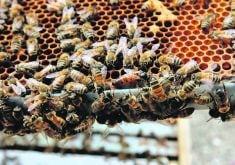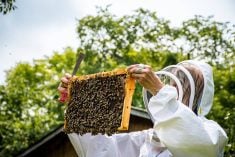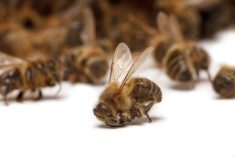A new knowledge and research transfer program will bring Manitoban beekeepers applied research and on-the-ground support that’s badly needed said Manitoba Beekeepers Association vice-chair Ian Steppler.
“It’s a direct investment into the grassroots of our industry. We’re quite excited about it,” Steppler said.
The Knowledge and Research Transfer Program (KRTP), which should begin January 1, will help develop and deliver training and applied research activities to enhance beekeepers’ growth and sustainability Steppler said.
The governments of Canada and Manitoba pledged $210,000 to establish the program announced ag minister Blaine Pedersen on October 14. Manitoba Beekeepers Association will establish the program, but it will be run at arm’s length from the organization.
“We’re trying to create a program that is, in a sense, purely a producer-driven program,” Steppler explained.
The program will focus on problems in the bee yard and translate high-level academic research into practical solutions, he said.
Read Also
Best before doesn’t mean bad after
Best before dates are not expiry dates, and the confusion often leads to plenty of food waste.
This will include a bee health monitoring service which will use sentinel hives to share knowledge on overall bee health and pest management according to a provincial news release. It will strengthen connections with veterinarians to manage bee health risks, and identify best management practices to reduce winter loss.
This support is crucial because beekeepers are struggling to keep up with advancing agriculture said Steppler.
Farmers (including Steppler who is a grain and cattle farmer as well as a beekeeper) are crops with fewer weeds, he said. They’re clearing trees and draining sloughs.
“We’re losing a diversity across the landscape, and bees thrive on natural plants to live. They need natural pollens from a whole bunch of different plants to feed and sustain themselves,” he said.
Massive crops of canola and sunflowers allow for large honey flows, but bees need to sustain themselves when those crops aren’t around. “Ultimately the hives are becoming malnourished and not as thrifty,” Stepper said.
KRTP should help the industry address those challenges, manage diseases and bring colonies back up to speed Steppler said.
The province said there are more than 900 beekeepers and 120,000 colonies in Manitoba, responsible for about $40 million annually in honey production. These bee colonies also produce an additional estimated $120 million in added value to crops that benefit from honey bee pollination.




